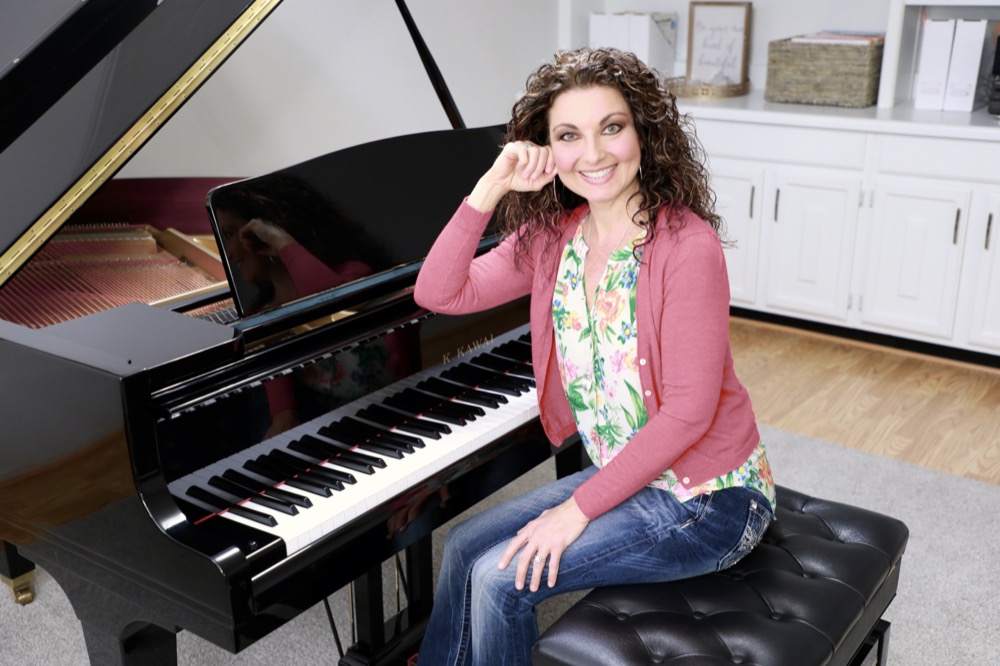How to Keep Piano Students Motivated and Thriving with Purposeful Language
This post may contain affiliate links. If you purchase something through an affiliate link, I will receive a small commission at no cost to you. For more information, read the disclosure statement here.

Are you looking for fresh (and easy!) ways to keep piano students motivated and thriving in their lessons week after week?
Music education research has revealed some very interesting insights into student motivation that could really create positive change in our teaching.
As piano teachers, we know that keeping students engaged is about more than just selecting the right pieces – it’s about nurturing our students as individuals and making them feel seen, heard, and supported throughout their entire musical journey.
Let’s take a closer look at three ways we can keep piano students motivated and thriving in our studios.
Keep Piano Students Motivated Through Language with Purposeful Praise
Think back to your most recent teaching day. How many times did you say “good job”?
While well-intentioned, research shows that generic praise doesn’t fuel long-term motivation.
I’ve had my moments getting stuck in generic language for sure! That’s why I completely eliminated the phrase “good job” from my teaching vocabulary.
Instead of using generic praise, praising effort and specific improvements creates resilient, motivated learners who stick with tasks longer (Dweck, 1999).
Research also shows that motivation is the best predictor of student retention (Anderson & Clifton, 2001).
Knowing that we can actually improve our student retention rates with something as simple as language is pretty exciting!
Keep piano students motivated by trying these meaningful alternatives to “good job”:
- “You didn’t give up on that tricky rhythm, and now your piece sounds so dance-like and bursting with energy – that kind of persistence will help you be able to tackle any tricky rhythm you come across!”
- “I can tell you worked hard on that section until you could play it with fabulous voicing between the hands – It sounds beautiful, and those are exactly the kinds of things musicians do to grow.”
- “Even though those chords were challenging, you kept working at them so you could play them cleanly at tempo – and that makes you stronger as a pianist.”
- “The way you problem-solved that difficult passage shows deep musical thinking and tons of determination.”
- “You’re tackling harder pieces each week because you’re doing a wonderful job reflecting on your performances and learning from your mistakes. Well done on sticking with the challenges!”
Focus on Strengths to Keep Piano Students Motivated and Engaged
If we look at the research in positive psychology, we’ll see that it suggests that motivated students thrive when we build on their existing strengths rather than focusing primarily on weaknesses (Snyder & Lopez, 2002).
I know I would rather build on my strengths than only focus on my weaknesses! I would definitely find that motivating and encouraging, and that would make it so much easier to bring the needed attention to my weaknesses.
And I believe our students would agree!
If you’re looking to keep piano students motivated, try taking a few minutes here and there to talk with your students and find out:
- What pieces or genres make your students’ eyes light up, are easy for them to play, etc. (for example, I love playing music from the Romantic era)
- Which aspects of music come naturally to them and play into their strengths (for me, it’s the lyrical melodies, creating color through voicing, and gorgeously-shaped phrases)
- How they personally connect with the music they’re learning (if it reminds them of a story, helps them think more deeply, creates fun problem-solving opportunities, sounds like “that cool song at my cousin’s birthday party”, etc.)
- Which aspects of music don’t come naturally to them and need more opportunities for nurturing (maybe they love playing scales, but they don’t like shaping phrases, so we can use their strength – scales – to help them improve a weakness – shaping phrases)
I think emphasizing our students’ strengths and using those strengths as a bridge to their weaknesses would be an easy and encouraging way to keep piano students motivated.

Create Emotional Connections to Keep Piano Students Motivated for Long-Term Student Retention
Did you know that emotional support is one of the strongest predictors of student retention?
So if you’re looking for a way to keep piano students motivated and thriving so they stay enrolled in piano lessons, you’ll love this idea.
Students stay motivated when they feel genuinely supported in their musical journey (Wanzel, 2011).
It’s amazing to know that our words of support can be so powerful and impactful and can help us create lasting connections with our students!
This makes me want to choose the best words for each of my students very carefully and purposefully so they feel encouraged and supported during every lesson.
What might this look like?
- We can create a safe and calming space in our studios for musical exploration, growth, and sharing.
- We can acknowledge and recognize our students when they have overcome large and small challenges – the small ones are as important as the large ones!
- We can listen to our students and be their biggest cheerleaders by celebrating personal victories alongside musical achievements.
The more our students feel our support, the more they will trust us and feel comfortable sharing with us.
They may start sharing even more personal victories and exciting moments that we can celebrate with them, which allows us to provide even more emotional support.
Here are some things my students have shared with me so we could celebrate:
- We learned the B-flat major scale in band today, and I already knew how to play it because of piano!
- I sang in the school talent show!
- My choir teacher let me play my recital piece for the whole choir today!
- I got 3rd place in the state spelling bee!
- I got one of the lead roles in the school play, and I get to sing a solo too!
- We’re going to New York City during Christmas break!
- We got 4 new chickens this week! (This was a hilarious story shared by one of my 9-year-olds who ALWAYS has a story for me at the end of her lesson, and I genuinely look forward to hearing what she wants to tell me!)
Aren’t these fun? I absolutely love it when my students want to share things like this with me so I can cheer them on and provide that support and validation that they’re seeking.
So if we’re needing a way to keep piano students motivated and thriving, providing connection and support are wonderful ways to do that.
Practical Steps for Piano Teachers to Keep Piano Students Motivated and Thriving
How can we continue to motivate our piano students from week to week so that they thrive as musicians and as individuals?
- Use purposeful praise to highlight their efforts as well as specific improvements from their practice. Need a quick way to praise your students? Try printable sticky notes!
- Focus on their strengths, and frame challenges and weaknesses as opportunities for growth (Learn more about growth mindset).
- Create a safe space and frequent opportunities for your students to share with you.
- Celebrate their major and minor accomplishments regularly and with enthusiasm.
It’s important for us to remember that our words of encouragement and support plant seeds that can help our students grow into lifelong musicians, and isn’t that our overall goal? To cultivate a love for music in our students so they continue enjoying it throughout their lives?
By implementing these strategies, we’re not just teaching piano – we’re nurturing thriving musicians every single week by using our language to keep piano students motivated throughout their time with us.
What is your favorite way to motivate your students and help them thrive? Share your thoughts and ideas on how to keep piano students motivated in the comments below!
References
Anderson, E., & Clifton, C. (2001). Strengths Quest: Discover and develop your strengths in academics career and beyond.
Boniwell, I. (2003). Student retention and positive psychology. Open University Student Retention Conference. UK.
Dweck, C. S. (1999). Self-theories: Their role in motivation, personality and development. Philadelphia, PA: Taylor & Francis.
Snyder, C., & Lopez, S. (2002). Handbook of Positive Psychology. Oxford: Oxford University Press.
Wanzel, L. (2011). Motivation and retention of students in the private piano studio. Problems in Music Pedagogy, 59.
Don't miss out!
Follow on Facebook and Instagram, join the best Facebook group for piano teachers, and subscribe to the newsletter to get helpful teaching tips, resources, and tutorials delivered straight to your inbox every week.
Melody Payne
Melody Payne
Welcome!

Hi! I’m Melody Payne, a pianist and piano teacher, educational resource author, a fun-loving wife to the most wonderful and talented hubby I could ask for, and a lifelong learner who loves to share. I want to make your life as a music teacher easier by writing and sharing helpful and relevant music teaching articles, and by creating educational resources with your very own students in mind. If you are a parent who wants to enroll your child in piano lessons, I’d love for us to get started building those skills that can give your child a lifetime of musical enjoyment!

